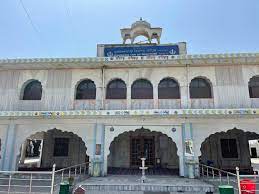Sikhism, founded in the 15th century by Guru Nanak Dev Ji in the Punjab region of India, is a monotheistic religion that emphasizes the importance of selfless service, known as “Seva.” Seva lies at the core of Sikh beliefs and practices, embodying the principles of compassion, humility, and communal welfare. It is a way of expressing devotion to the divine and fulfilling one’s duty as a responsible member of the human family. The concept of Seva is deeply ingrained in the Sikh psyche and serves as a guiding principle in their daily lives.
The term “Seva” itself translates to “selfless service,” emphasizing that the act is undertaken without any expectation of personal gain or reward. It is a fundamental aspect of Sikh philosophy and is considered a means to attain spiritual growth and connect with the divine. Sikhs believe that by serving others, they are serving the Divine Creator, recognizing the divine spark within every individual.
Seva is not limited to any specific activity or social class; it can be as simple as helping someone in need, assisting at a community kitchen, or participating in charitable initiatives. The spirit of Seva extends beyond just offering material aid; it includes providing emotional support, lending a listening ear, or offering a helping hand to those facing hardships.
Sikhism encourages individuals to engage in Seva both within their community and in the wider world, promoting a sense of unity and oneness with all humanity.
One of the most significant expressions of Seva in Sikhism is the “Langar” – a community kitchen that serves free meals to anyone, regardless of caste, creed, gender, or social status. The concept of Langar was introduced by Guru Nanak Dev Ji himself as a way to challenge the prevailing social norms and promote equality and inclusivity. Every Sikh Gurudwara (place of worship) around the world follows this tradition, where volunteers selflessly work together to prepare and serve food to all visitors. By sitting together on the floor and sharing the same meal,
Langar reinforces the principle that all humans are equal and deserving of respect and dignity.
The practice of Seva extends to various other aspects of Sikh life. Sikhs actively engage in humanitarian aid, disaster relief, and educational initiatives for marginalized communities. They are also involved in environmental conservation and efforts to promote sustainable living. Through these actions, Sikhs demonstrate their commitment to not only bettering the lives of others but also protecting and preserving the natural world, which is seen as a manifestation of the Divine.
Guru Nanak
Sikhism was started by Guru Nanak. He was born to a Hindu family in the Punjab, which is today in Pakistan but was then a part of India, more than 500 years ago. He refused the Sacred Thread rite, which Hindu males must go through to be initiated into the Hindu faith when he was 13 years old.
Guru Nanak encountered significant occasions during his life that caused him to:
Rejecting the caste system present in Hinduism, Sikhism teaches that all people are created equal and the three pillars of Sikhism explain this.
Seva is also deeply integrated into Sikh festivals and celebrations. During special occasions and religious events, Sikhs come together to organize processions, clean public spaces, and distribute food and sweets to all, irrespective of their faith or background. These collective acts of service foster a sense of community and unity among the Sikh population and serve as an inspiration for others to contribute to the well-being of society.
The concept of Seva is not limited to Sikhs alone; it is an idea that transcends religious boundaries. Many Sikhs believe that acts of selfless service can be a stepping stone for spiritual growth and a way to experience a profound connection with the Divine, regardless of one’s faith or beliefs.
The significance of Sangat
Being a part of the Sangat, according to Sikhs, is a crucial aspect of existence. If they are to go through the Five Khandas or five levels of emancipation, it is necessary. Individuals can grow spiritually and become more gurmukh by being a part of the Sangat.
Why the Sangat is significant
- It aids Sikhs in their spiritual growth.
- It fosters a sense of togetherness among Sikhs and demonstrates their faith in the universality of mankind.
- It offers chances for sewa or unselfish service. Sikhs can remember God at all times by helping others in the Sangat.
- Learning about Sikhism’s past is beneficial to Sikhs.
- It offers people financial assistance.
In conclusion, Seva is the heart of Sikhism, encapsulating the spirit of selflessness, compassion, and unity. It goes beyond the mere fulfillment of religious obligations and extends to every aspect of a Sikh’s life. Through Seva, Sikhs strive to make a positive impact on the world and uphold the values of equality, social justice, and community welfare. By embracing the concept of Seva, individuals can foster a sense of responsibility towards their fellow beings and contribute to creating a more harmonious and inclusive society.








